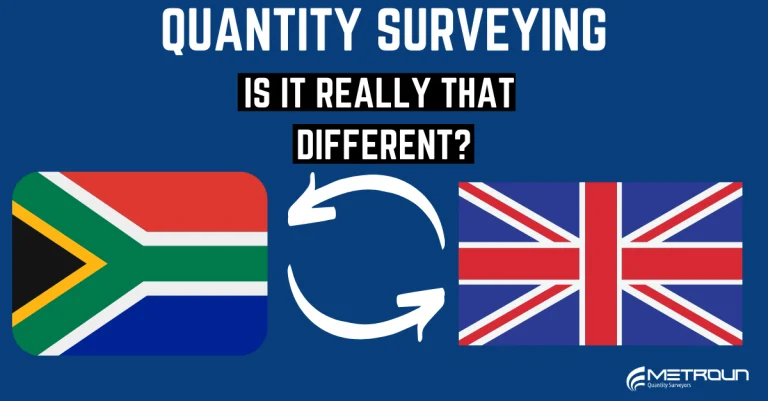The UK and South Africa are very different countries. The cost of living in the UK is roughly double that of South Africa, and while the UK is densely populated, South Africa is over five times larger in size.
But what about quantity surveying? How do the two countries compare in terms of careers, salaries, demographics, and professional practice?
In this article, we’ll answer key questions about quantity surveying in the UK and South Africa, including:
- Which contract types dominate?
- What are the progression job titles?
- What is the average salary at each stage?
- How many quantity surveyors work in each country?
- What is the male/female split?
- What are the average working hours?
- What chartership options are available?
Quantity Surveying Job Titles
In the UK:
- Apprentice or Trainee QS
- Graduate or Assistant QS
- Quantity Surveyor
- Senior QS
- Managing QS
- Commercial Manager
In South Africa:
- Student QS
- Graduate or Intern QS
- Junior QS
- Intermediate QS
- Senior QS
- Commercial Manager
Average Salaries
Based on Glassdoor (UK) and Payscale (South Africa):
UK salaries:
- Apprentice/Trainee: £17,500 (R377,000)
- Graduate/Assistant: £27,500 (R592,000)
- Quantity Surveyor: £39,000 (R840,000)
- Senior QS: £54,000 (R1,160,000)
- Managing QS: £65,500 (R1,400,000)
- Commercial Manager: £71,000 (R1,500,000)
South Africa salaries:
- Student QS: R96,000 (£4,488)
- Intern/Graduate QS: R175,000 (£8,181)
- Junior QS: R294,000 (£13,744)
- Intermediate QS: R329,414 (£15,399)
- Senior QS: R648,268 (£30,300)
- Commercial Manager: R900,256 (£42,000)
Number of Quantity Surveyors
UK: 47,135 QSs (Statista).
South Africa: 4,539 registered professionals and candidates (SACQSP).
Gender Split
UK: 89.5% male (42,214) and 10.5% female (4,921).
South Africa: 89.3% male and 10.7% female (StatsSA).
Average Working Hours
UK: 36 hours per week on paper (Career Smart), though many QSs work 40–45 hours.
South Africa: Around 45 hours per week (Active Payroll).
Chartership Options
UK: Primarily RICS (Royal Institution of Chartered Surveyors), with CICES (Chartered Institution of Civil Engineering Surveyors) becoming increasingly relevant.
South Africa: The main routes are SACQSP (South African Council for the Quantity Surveying Profession) and RICS.
Dominant Contract Types
UK: Mainly JCT and NEC, with JCT being the most widely used. ACA and CIOB are less common.
South Africa: Four major forms—JBCC, FIDIC, GCC, and NEC. Of these, JBCC is the most common.
Final Thoughts
While the UK and South Africa differ vastly in geography, economy, and cost of living, the quantity surveying profession shows striking similarities—particularly in career progression, gender split, and reliance on standard contract forms.
There are, however, notable differences in salaries, working hours, and the dominant forms of contract.
This comparison highlights how the profession adapts to local conditions while maintaining a shared global framework.
👉 If you’re a QS in the UK or South Africa and think we’ve missed something, we’d love to hear from you in the comments below.
Watch our video on Quantity Surveying: The Differences Between The UK & South Africa here:
How we can help
Here at Metroun we can offer you commercial support when working on a construction project. We can tailor the support to suit your needs. Want to be commercial independent? We can provide industry ready templates. Require a full-time QS? We can provide you with highly skilled Quantity Surveyors to manage the commercial aspect on your projects. Need some extra support? We can provide you with guidance and support as and when you need.










